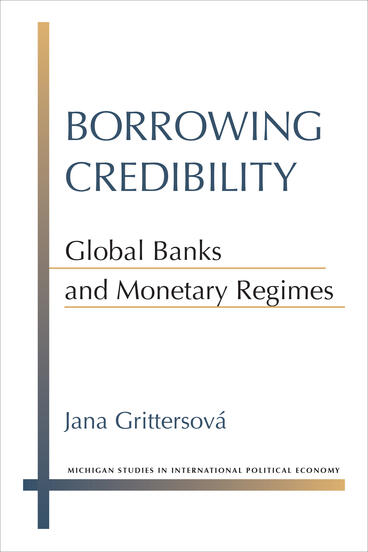Explores multinational banks’ role in enhancing monetary credibility, revealing the importance of market confidence in an interconnected world
Description
Nations with credible monetary regimes borrow at lower interest rates in international markets and are less likely to suffer speculative attacks and currency crises. While scholars typically attribute credibility to domestic institutions or international agreements, Jana Grittersová argues that when reputable multinational banks headquartered in Western Europe or North America open branches and subsidiaries within a nation, they enhance that nation’s monetary credibility.
These banks enhance credibility by promoting financial transparency in the local system, improving the quality of banking regulation and supervision, and by serving as private lenders of last resort. Reputable multinational banks provide an enforcement mechanism for publicized economic policies, signaling to international financial markets that the host government is committed to low inflation and stable currency.
Grittersová examines actual changes in government behavior of nations trying to gain legitimacy in international financial markets, and the ways in which perceptions of these nations change in relation to multinational banks. In addition to quantitative analysis of over 80 emerging-market countries, she offers extensive case studies of credibility building in the transition countries of Eastern Europe, Argentina in 2001, and the global financial crisis of 2008. Grittersová illuminates the complex interactions between multinational banks and national policymaking that characterize the process of financial globalization to reveal the importance of market confidence in a world of mobile capital.
Jana Grittersová is Associate Professor of Political Science and Cooperating Faculty at the Department of Economics at the University of California, Riverside.
Reviews
“The rigorous and detailed qualitative and quantitative evidence that Grittersová presents ensures that Borrowing Credibility will become the definitive treatment of monetary reform and financial integration in Eastern Europe.”
—Thomas Oatley, University of North Carolina at Chapel Hill
“In Borrowing Credibility, Jana Grittersová makes an important contribution to international political economy by showing that global banks provide previously unrecognized benefits to developing countries’ creditworthiness and financial stability. This book will definitely shape how both scholars and policymakers approach the role of international banks.”
—J. Lawrence Broz, University of California, San Diego
"Credibility is essential for effective economic policy, but it is elusive as an attribute of governments and as an analytic concept. In this important book, Jana Grittersova gives this elusive concept new content. She explains and then documents how governments in Central Europe, and in emerging markets generally, have been able to gain credibility through their interaction with foreign banks. Borrowing Credibility is a major contribution to the theoretical and empirical literatures in international relations and international economics alike."
—Barry Eichengreen, University of California, Berkeley“In Borrowing Credibility, Jana Grittersová addresses a central problem for transition and developing-economy governments: how to establish a reputation for monetary and financial reliability. She suggests that governments can “import” this reputation by attracting well-known foreign financial institutions to set up shop. With well-designed and informative case studies from Eastern and Central Europe and Latin America, and a cross-national statistical analysis, she shows that foreign bank presence can help governments demonstrate their willingness and ability to provide an environment of low inflation and financial stability. This book will be of interest to anyone concerned with monetary and financial issues in developing, emerging, and transition economies.”
—Jeffry Frieden, Harvard University
“Borrowing Credibility persuasively argues that transition countries with little or no track record in monetary and financial regulatory policy can “borrow” the good reputation of more advanced countries by encouraging the entry of prestigious multinational banks. This study challenges conventional wisdom that links such credible commitment to the establishment of legally independent central banks or membership in international organizations. Rather, drawing on impressive quantitative and qualitative evidence, it demonstrates that only the presence of these foreign and private financial actors can successfully lend rapid monetary and fiscal credibility to an economy in transition. It will be of significant interest to scholars of international and postcommunist political economy, economists, and financial policymakers.”
—Juliet Johnson, McGill University

